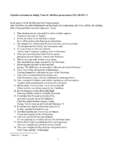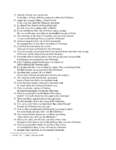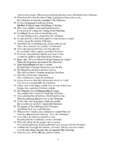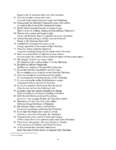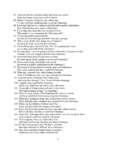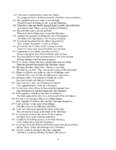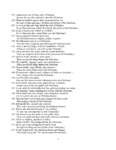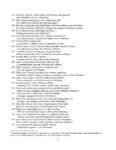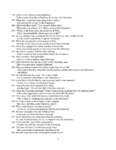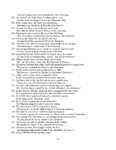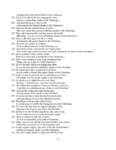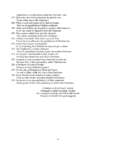Discourses of Muslim Scholars in Colonial Ghana
by John Hanson and Muhammad al-Munir Gibrill
Colonial Rule 3 (historical poem)
Creator: al-ḥājj 'Umar ibn Abī Bakr (al-ḥājj Umar Krachi)
Description: This historical poem is one of three composed by al-ḥājj 'Umar ibn Abī Bakr of Kete-Krachi (commonly al-ḥājj 'Umar Krachi) to describe and comment on European colonial rule in West Africa.
Al-ḥājj 'Umar Krachi was positioned well to provide commentary from a West African Muslim perspective on the European colonial advance into the region during the late nineteenth century. He was born in the Sokoto Caliphate established by Muslims rallying behind 'Uthmān dan Fodio's call for Muslim reform in the early nineteenth century; at the time of the European conquest, he was residing in the Hausa diaspora in two Muslim commercial towns (Salaga and later Kete-Krachi, both in today's Ghana) that were connected to Muslim scholarly and commercial networks throughout the savanna and rainforest. Al-ḥājj 'Umar Krachi heard reports from traveling Muslim scholars and merchants of the military advance of various European powers, and his commentaries, in three poems written over the course of a decade, provide his evolving view of European colonialism in West Africa.
The third poem is written in Hausa and not Arabic. Al-ḥājj 'Umar Krachi also shifts the focus almost exclusively to northern Nigeria. Finally, it was written several years after the initial two poems, when the violence of the European conquest largely had ceased and colonial consolidation had begun.
Al-ḥājj 'Umar Krachi's attitude toward European colonialism differs in this poem from the first two colonial poems. He shifts from a fervent religious expectation of God's intervention and offers a dispassionate commentary of the changes associated with European colonial rule. The focus on northern Nigeria also allows al-ḥājj 'Umar to situate the colonial conquest into a narration regarding the process whereby the Sokoto Caliphate declined and was subsumed into the British colonial sphere.
The poem reviews some of the transformations associated with colonial rule. Al-ḥājj 'Umar Krachi notes the emphasis on a clean environment and the building of new roads and bridges. He also notes the new judicial system that accords equality to all irrespective of social rank, gender or age. Whereas in the second poem al-ḥājj 'Umar expressed discontent that the social hierarchy had been disrupted, in this poem he stresses the beneficial changes: nobles are treated equally as commoners, and slaves and women no more can be abused by their masters and husbands, respectively. This poem reveals that al-ḥājj 'Umar appreciates the reforms introduced by the colonial judicial system and understood the corruption of the Sokoto Caliphate's judicial system as symptomatic of its decline from the era of its founding by 'Uthmān dan Fodio.
The reversal of al-ḥājj 'Umar Krachi's perspective on colonial rule in this poem, in contrast to the first two historical poems on colonial rule, is evident throughout the poem. It is particularly clear in his closing satirical depiction of animals and birds: he changes the usual roles of aggressor and victim to underscore the reversal. Additional evidence of his different perspective are the poem's concluding lines:
For my part, I am thankful to God, in their era
For they have treated me well, these Christians.
As much as I am concerned, may their rule last forever! Because I live a life of prosperity, under Christian rule.
Al-ḥājj 'Umar Krachi was positioned well to provide commentary from a West African Muslim perspective on the European colonial advance into the region during the late nineteenth century. He was born in the Sokoto Caliphate established by Muslims rallying behind 'Uthmān dan Fodio's call for Muslim reform in the early nineteenth century; at the time of the European conquest, he was residing in the Hausa diaspora in two Muslim commercial towns (Salaga and later Kete-Krachi, both in today's Ghana) that were connected to Muslim scholarly and commercial networks throughout the savanna and rainforest. Al-ḥājj 'Umar Krachi heard reports from traveling Muslim scholars and merchants of the military advance of various European powers, and his commentaries, in three poems written over the course of a decade, provide his evolving view of European colonialism in West Africa.
The third poem is written in Hausa and not Arabic. Al-ḥājj 'Umar Krachi also shifts the focus almost exclusively to northern Nigeria. Finally, it was written several years after the initial two poems, when the violence of the European conquest largely had ceased and colonial consolidation had begun.
Al-ḥājj 'Umar Krachi's attitude toward European colonialism differs in this poem from the first two colonial poems. He shifts from a fervent religious expectation of God's intervention and offers a dispassionate commentary of the changes associated with European colonial rule. The focus on northern Nigeria also allows al-ḥājj 'Umar to situate the colonial conquest into a narration regarding the process whereby the Sokoto Caliphate declined and was subsumed into the British colonial sphere.
The poem reviews some of the transformations associated with colonial rule. Al-ḥājj 'Umar Krachi notes the emphasis on a clean environment and the building of new roads and bridges. He also notes the new judicial system that accords equality to all irrespective of social rank, gender or age. Whereas in the second poem al-ḥājj 'Umar expressed discontent that the social hierarchy had been disrupted, in this poem he stresses the beneficial changes: nobles are treated equally as commoners, and slaves and women no more can be abused by their masters and husbands, respectively. This poem reveals that al-ḥājj 'Umar appreciates the reforms introduced by the colonial judicial system and understood the corruption of the Sokoto Caliphate's judicial system as symptomatic of its decline from the era of its founding by 'Uthmān dan Fodio.
The reversal of al-ḥājj 'Umar Krachi's perspective on colonial rule in this poem, in contrast to the first two historical poems on colonial rule, is evident throughout the poem. It is particularly clear in his closing satirical depiction of animals and birds: he changes the usual roles of aggressor and victim to underscore the reversal. Additional evidence of his different perspective are the poem's concluding lines:
For my part, I am thankful to God, in their era
For they have treated me well, these Christians.
As much as I am concerned, may their rule last forever! Because I live a life of prosperity, under Christian rule.
Date: 1907
Date Range: 1900-1909
Location: Kete-Krachi , Volta Region, Ghana
Format: Text/pdf
Language: English
Rights Management: Educational use only, no other permissions
Contributing Institution: Muhammad al-Munir Gibrill; John H. Hanson; Institute of African Studies, University of Ghana at Legon;MATRIX: The Center for Humane Arts, Letters & Social Sciences Online at Michigan State University
Contributor: Muhammad al-Munir Gibrill (translator and transcriber); John H. Hanson (reviewer)
Digitizer: Muhammad al-Munir Gibrill ; MATRIX
Archive: University of Ghana at Legon, Institute of African Studies
Source:
University of Ghana at Legon, Institute of African Studies Arabic collection, document number 109 (v). The collection holds other copies: document numbers 43, 302, and 370.
